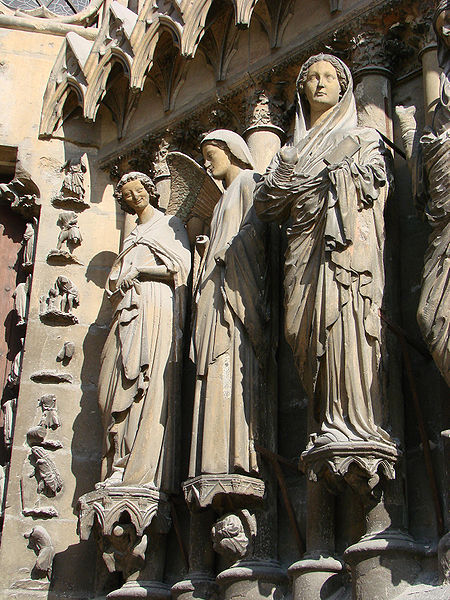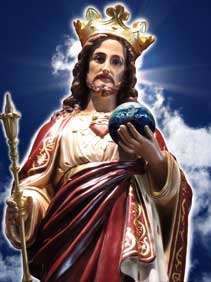
(The State is assuming the functions of the private sphere.)
Is there a right to health care and must the State provide it?
The great controversy over health care reform is centered on concerns of countless Americans that proposed legislative changes will move the country yet one more step down the road toward State intervention and socialism.
This concern is well founded. For decades, the State at all levels and branches has increasingly absorbed the functions of the private sphere. It has weakened the social fabric of the nation by usurping many rights and privileges of individuals, families and businesses with excessive regulation and bureaucratic red tape.
It has imposed similar burdens on those private associations which are the natural intermediate bodies between the individual and the State, such as institutions of the Catholic Church1 and other religious bodies; health and educational institutions; trade and labor associations; and countless charitable groups.
Many Americans are now concerned that direct State intervention in health care will go yet farther and lead to the socialization of our economy.
Respecting the Principles of a Christian Social Order
There is no doubt that the State can act within the principle of authority which affirms the need for a moral force in society capable of efficaciously directing and encouraging the actions of all towards the common good of the social body.
However, there are two other pillars of a Christian social order that must be considered. First, the principle of solidarity, derived from the common nature of men, which leads them to show mutual concern and support for others. There is also the principle of subsidiarity— whereby what can be done by an individual or smaller group is not assigned to a larger group.
This principle stems from the fact that man is not only a social being but also a rational, essentially free and responsible being. Thus, he is guaranteed the right to resolve his problems either by himself, through his family or other intermediate social bodies without being obliged to wait for solutions from public authority.
When the State intervenes unnecessarily in the life of its citizens, it invokes the principle of authority to suppress the principles of solidarity and subsidiarity. However, while the principle of authority is fundamental for the promotion of the common good, its role is to support and complement the principles of solidarity and subsidiarity, not to destroy them.
Without balance and harmony among these three fundamental principles, society falls into disarray and easily slides towards totalitarianism, a regime that respects neither individual rights nor freedom.2
Undue State intervention in the private sphere (that is, individuals, families, businesses, religious and other associations) inexorably leads to socialism.
The Principle of Subsidiarity in the Compendium of the Social Doctrine of the Church
Subsidiarity is among the most constant and characteristic directives of the Church's social doctrine and has been present since the first great social encyclical. It is impossible to promote the dignity of the person without showing concern for the family, groups, associations, local territorial realities; in short, for that aggregate of economic, social, cultural, sports-oriented, recreational, professional and political expressions to which people spontaneously give life and which make it possible for them to achieve effective social growth.
This is the realm of civil society, understood as the sum of the relationships between individuals and intermediate social groupings, which are the first relationships to arise and which come about thanks to “the creative subjectivity of the citizen”.
This network of relationships strengthens the social fabric and constitutes the basis of a true community of persons, making possible the recognition of higher forms of social activity.
The necessity of defending and promoting the original expressions of social life is emphasized by the Church in the Encyclical Quadragesimo Anno, in which the principle of subsidiarity is indicated as a most important principle of “social philosophy”.
“Just as it is gravely wrong to take from individuals what they can accomplish by their own initiative and industry and give it to the community, so also it is an injustice and at the same time a grave evil and disturbance of right order to assign to a greater and higher association what lesser and subordinate organizations can do.
For every social activity ought of its very nature to furnish help to the members of the body social, and never destroy and absorb them.” (Internal notes omitted)
(Pontifical Council for Justice and Peace, Compendium of the Social Doctrine of the Church, nn. 185-186)
Pope Benedict XVI:
“We do not need a State which regulates and controls everything”
“The State which would provide everything, absorbing everything into itself, would ultimately become a mere bureaucracy incapable of guaranteeing the very thing which the suffering person − every person − needs: namely, loving personal concern.
We do not need a State which regulates and controls everything, but a State which, in accordance with the principle of subsidiarity, generously acknowledges and supports initiatives arising from the different social forces and combines spontaneity with closeness to those in need. … In the end, the claim that just social structures would make works of charity superfluous masks a materialist conception of man: the mistaken notion that man can live ‘by bread alone’ (Mt 4:4; cf. Dt 8:3) − a conviction that demeans man and ultimately disregards all that is specifically human.”
(Pope Benedict XVI, Encyclical Deus Caritas Est, Dec. 25, 2005, n. 28)
Pope Pius XI:
“No one can be at the same time a good Catholic and a true socialist”
“Society, therefore, as Socialism conceives it, can on the one hand neither exist nor be thought of without an obviously excessive use of force; on the other hand, it fosters a liberty no less false, since there is no place in it for true social authority, which rests not on temporal and material advantages but descends from God alone, the Creator and last end of all things.
“If Socialism, like all errors, contains some truth (which, moreover, the Supreme Pontiffs have never denied), it is based nevertheless on a theory of human society peculiar to itself and irreconcilable with true Christianity. Religious socialism, Christian socialism, are contradictory terms; no one can be at the same time a good Catholic and a true socialist.
(Pius XI, Encyclical Quadragesimo Anno, May 15, 1931, nn. 119-120)
Socialism: A Utopian Ideology
Socialism is a utopian ideology that seeks to eliminate human selfishness by destroying individual freedom, private property and free enterprise. Socialists believe they can eliminate injustice by transferring responsibilities from individuals and families to the State. However, their efforts are tantamount to killing the patient to cure his illness.
By suppressing individual responsibility, socialism actually creates the greatest possible injustice because it destroys true liberty, which is every man’s freedom to decide for himself all matters that lie within his competence, to follow the course shown by his own reason, and to keep within the laws of morality and the dictates of justice and charity.
Socialism is anti-natural because it destroys man’s initiative — a fruit of his intellect and free will — which tends to manifest itself in everything he does. When the State replaces individual initiative, socialism’s totalitarian aspect enters with the inherent appearance of government and police repression that has been abundantly seen wherever it is implemented.

The state does not have the
obligation to provide health
care.
Is There a Right to Health Care?
According to natural law, man has the right to take care of his own health and physical integrity. However, this individual freedom does not mean that the State must provide for one’s health care at others’ expense.
Take property rights, for example. Every man has the right to acquire property. However, this natural freedom does not oblige the State to give him property. Likewise, the fact that every man has a right to take care of his health needs does not oblige the State to give him direct medical assistance at taxpayers’ expense.
Under natural law, the State’s obligation is to further the common good and guarantee the rule of law so that no one is prevented from seeking the means to obtain treatment, just as no one is prevented from acquiring property.
Thus, in ordinary circumstances, the State is under no strict obligation to provide health care for citizens, though it must foster general conditions that are favorable to the health of all.
The State has no right to intervene directly in health care except in a subsidiary way, as it has done for years, when private initiative (including the efforts of religious and charitable organizations) is unable to provide health care. However, it must do this in a way that never weakens, much less destroys, private initiative.
One might ask how the poor who cannot afford heath care should obtain it. In virtue of the principle of solidarity and above all of Christian charity, it behooves primarily society, through its members, particularly the most wealthy, be it individually, be it through charitable organizations, to come to the aid of those who are unable to provide by themselves for their health needs, as is amply done already through America’s own extensive charitable networks.3
Right to Health Care or to Procure it?
Most Rev. Joseph F. Naumann, Archbishop of Kansas City, Kansas, and Most Rev. Robert W. Finn, Bishop of Kansas City-St. Joseph (Missouri), have made some important distinctions that help clarify the debate.
Quoting from a document of the Catholic Medical Association, the two bishops remind the faithful that instead of speaking of the “Right to Health Care,” it is more appropriate to speak of the “Right to Acquire the Means of Procuring for One’s Self and One’s Family these goods and concomitantly, a duty to exercise virtue (diligence, thrift, charity) in every aspect of their acquisition and discharge.”4
The bishops go on to say that “the right of every individual to access health care does not necessarily suppose an obligation on the part of the government to provide it.…The teaching of the Universal Church has never been to suggest a government socialization of medical services. Rather, the Church has asserted the rights of every individual to have access to those things most necessary for sustaining and caring for human life, while at the same time insisting on the personal responsibility of each individual to care properly for his or her own health.” Existing safety nets “are not intended to create permanent dependency for individuals or families upon the State, but rather to provide them with the opportunity to regain control over their own lives and their own destiny.”5
State Centralization Obstructs Health Care
To centralize health care in the hands of the State also harms the speed and efficiency of the medical assistance being provided. It further destroys the natural and trusting relationships between physicians and other health providers with their patients. Everything tends to become impersonal and remote.
Centralization is not possible without creating a huge bureaucratic machine which will absorb hard-earned taxpayer dollars which should be applied to those purposes the State is directly responsible for.
Bishops Warn of Dangers
Several other Catholic bishops have emphasized this centralizing aspect of the health care debate. In this sense, Most Rev. R. Walker Nickless, Bishop of Sioux City, Iowa warns that health care should not be subject to "federal monopolization" and that "the proper role of government is to regulate the private sector in order to foster healthy competition and curtail abuses. Therefore any legislation that undermines the viability of the private sector is suspect."6
In the same line, Most Rev. Thomas G. Doran, Bishop of Rockford, Illinois, writes: "Our federal bureaucracy is a vast wasteland strewn with the carcasses of absurd federal programs which proved infinitely worse than the problems they were established to correct.” He continues: “Modern socialist governments like to control…the means to protect and extend life. Some have called the current efforts of our federal government ‘senioricide’ or ‘infanticide.’ That perhaps is too severe, but we as Catholics should take care that health care does not morph into life control."7
Most Rev. James V. Johnston, Bishop of Cape-Girardeau and Springfield, Missouri, writes: “One might legitimately ask if giving a large, inefficient, but powerful bureaucracy like the federal government control of health care is a wise move. For one, this runs counter to the well-known principle of subsidiarity, so prominent in Catholic social teaching.… Certainly, [the government] has a role to play, but that does not necessarily mean that it should be the sole provider of health care.…The essential element of the principle of subsidiarity is the protection of individual freedoms from unjust micromanagement and manipulation by the state.”8
Likewise, Most Rev. Charles J. Chaput, O.F.M. Cap., Archbishop of Denver, writes: "[A] proper government role in solving the health-care crisis does not necessarily demand a national public plan, run or supervised by government authorities. Real health-care reform need not automatically translate into federal programming."9
In a letter to the clergy and faithful of his diocese, Most Rev. Samuel J. Aquila, Bishop of Fargo, North Dakota, cites the danger of thinking "the national government is the sole instrument of the common good."10
Abortion and Health Care Reform
Finally, the issue of abortion must be addressed since the nefarious practice is not health care but its contrary. Although proponents have insisted that the various Majority-supported bills will not favor abortion, this assertion does not withstand serious scrutiny. Amendments that would have clearly excluded abortion were rejected in committee. Further, there is every reason to believe that, in the future, the courts could rule that, constitutionally, abortion cannot be excluded from coverage.
The risk that abortion and euthanasia will somehow be included in the health care reform legislation is in itself grounds to oppose it. Cardinal Justin Rigali, Archbishop of Philadelphia, and numerous other prelates have gone on record to reiterate that this is a line the Church cannot cross.11
In light of the considerations above, the American TFP calls on the nation to redouble its vigilance and its peaceful and legal opposition to any health care reform that favors an increase in State interventionism in the private sector, abortion or other anti-natural initiative.
Socialism will not resolve the problems inside the American health care system. Indeed, it will destroy the present system at its very core and thus irreversibly ruin that which, despite its shortcomings, is universally recognized as one of the best systems in the world.
May Our Lady, Consoler of the Afflicted, help the nation’s elected officials to resist the temptation to implement any kind of socialism. Rather, let them be faithful to the ,morals and principles underpinning a truly Christian and just social order.
September 21, 2009
The American TFP
The above statement was published in The Washington Times of September 22, 2009
___________________________
Footnotes
1 An estimated 25% of America’s hospitals are associated with the Catholic Church. One should also consider the
thousands of Catholic schools and colleges, cemeteries, and untold charitable projects to help the poor.
2 Cf. Baltasar Péres Argos, S.J., “Los Cuatro Pilares fundamentales del Ordem Social y Economico, Segun la Doctrina de la Iglesia,” Verbo, Mar.-Apr. 1991.
3 The right to health care by those who cannot afford it is a right based in charity, not in strict justice. Now then, the rights based in charity “are rights latu sensu as they do not oblige with precision and are not enforceable (legally).” (Régis Jolivet, Traité de Philosophie [Paris: Emmanuel Vitte, 1949], Vol. 4, p. 153 – Our translation). Cf. Joseph Rickaby, S.J., Moral Philosophy: Ethics, Deontology and Natural Law (London: Longmans, Green & Co., Ltd., 1929), pp. 246-247; Michael D. Greaney, “Universal Health Care—Justice or Charity?” Social Justice Review, Sept.-Oct. 2003, p. 132.
4 Archbishop Joseph F. Naumann and Bishop Robert W. Finn, Joint Pastoral Statement on Principles of Catholic Social Teaching and Health Care Reform, Aug. 22, 2009,
www.diocese-kcsj.org/news/viewNews.php?nid=60. (The bishops’ emphasis.)
5 Ibid.
6 Bishop R. Walker Nickless, Pastoral Message on the Assumption of Mary, Aug. 17, 2009,
www.scdiocese.org/DioceseofSiouxCity/AssumptionofMary/tabid/415/Default.aspx.
7 Bishop Thomas G. Doran, “Concerns to take to heart in health care and proposed reforms,” The Observer, Aug. 7, 2009 at
observer.rockforddiocese.org/Columnists/BishopThomasGDoran/
BishopDoran2009columns/August72009/tabid/2259/Default.aspx.
8 Bishop James V. Johnston, “Skinning the ‘Health Care Cat,’” The Mirror, Sept. 4, 2009, at
home.catholicweb.com/diocspfdcape/index.cfm/NewsItem?id=272041
9 Archbishop Charles Chaput, O.F.M. Cap., “Health care, justice, and the course of our national debate,” Denver Catholic Register, Sept. 2, 2009, at
www.archden.org/index.cfm/ID/2491/Archbishop.
10 Bishop Samuel Aquila, Letter of Aug. 28, 2009, at www.fargodiocese.org/Bishop/Homilies/HealthCare20090828.pdf.
11 Cf. Aug. 11, 2009 letter from Cardinal Justin Rigali as Chairman of the USCCB Committee on Pro-Life Issues to the U.S. House of Representatives, at www.usccb.org/prolife/CardRigaliHealthCareReformLetter-08-11-09.pdf.



 BRUSSELS, March 30, 2010 (
BRUSSELS, March 30, 2010 (











